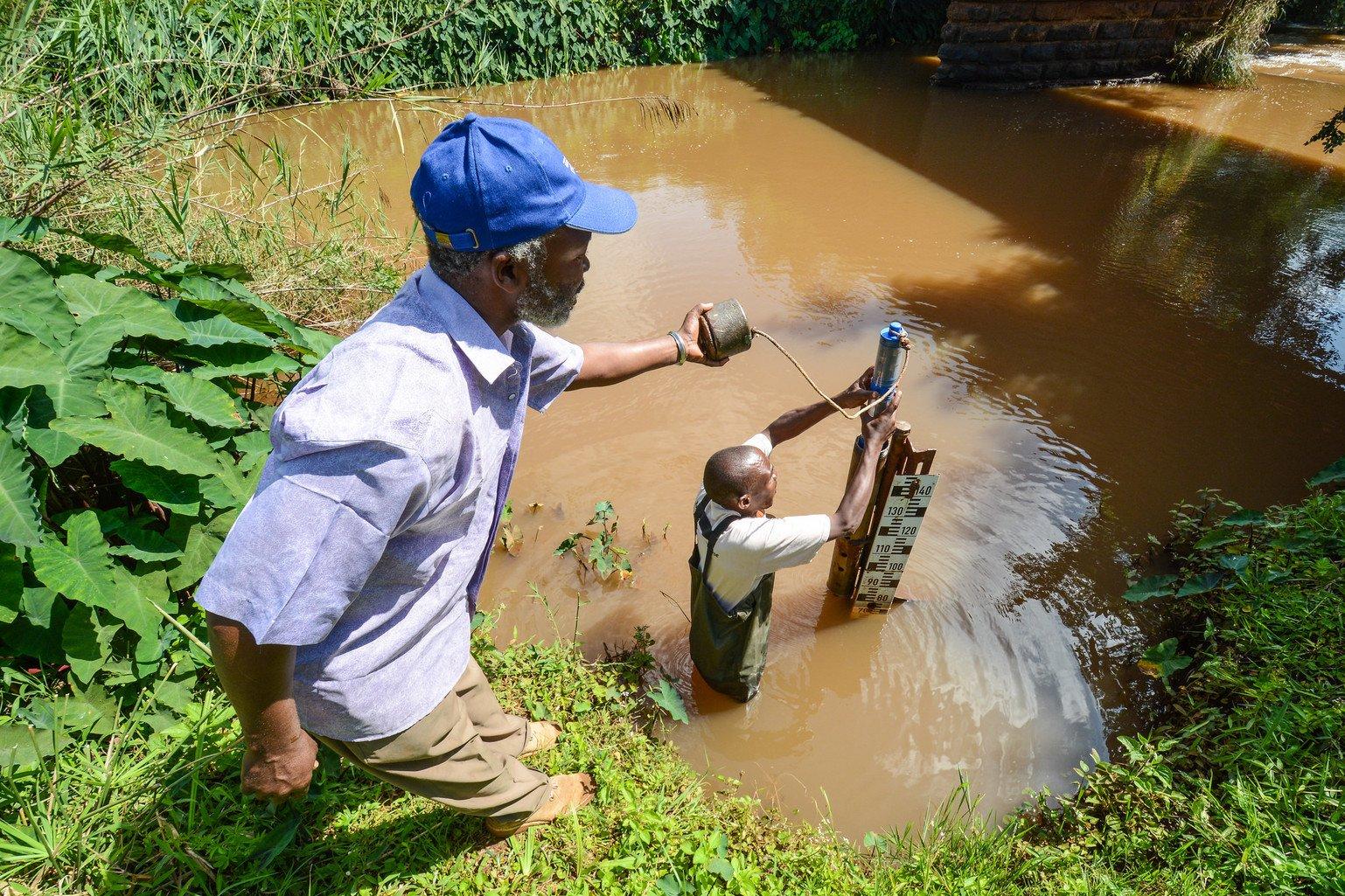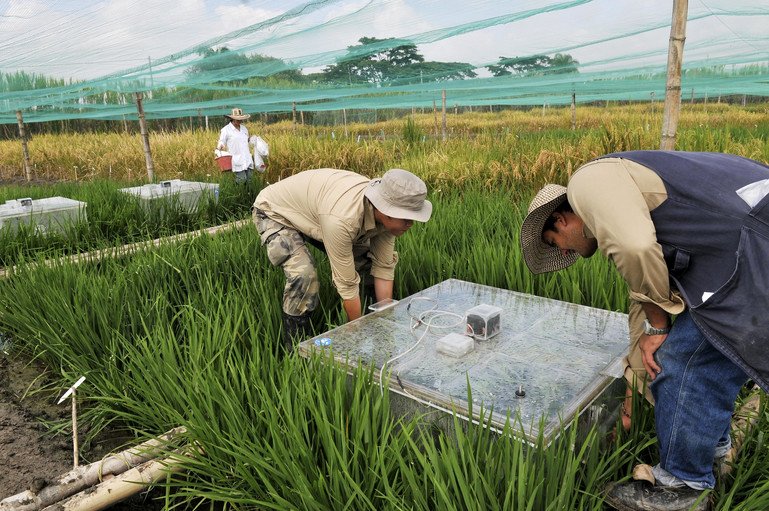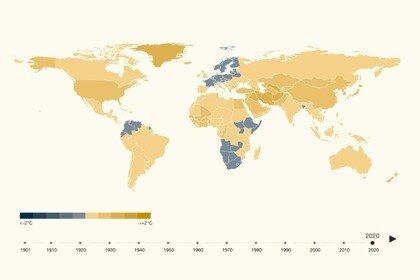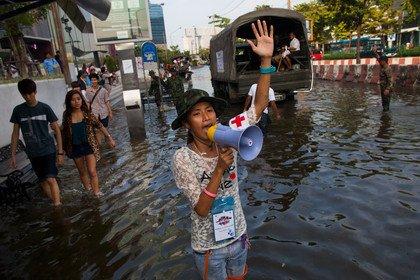Explained: How climate change affects mental health
Climate change is a global health crisis, and that includes mental health. Find out how it’s impacting our mental health and what can be done to prevent and manage it.
It’s not enough to just have more climate and health data. There must also be data equity or “equality of data”. Climate and health experts Alice Bell and Felipe Colón explain what that looks like and why it matters.

Georgina Smith / CIAT
Colleagues at the Kenyan Water Resource Management Authority (WRMA), testing water samples from the Tana River watershed in Kenya.
Digital Content and Social Media Producer, Wellcome
Digital Content and Social Media Producer, Wellcome
Take this scenario: if a pregnant woman with a heart condition passes away, is there a straightforward, reliable way to find out whether she died during a heatwave? Or whether she had access to preventive measures like air conditioning?
Without answers to these questions, how can we make sure these tragedies are less likely to happen?
This is just one of the many ways context-specific data (data that takes specific contexts like geographical location into consideration) can be useful for mitigating and adapting to the health impacts brought on by the climate crisis.
“One of the things that's really important is that we fill a lot of the data gaps and that we have equality of data,” Alice Bell, Wellcome’s Head of Climate and Health Policy team, spoke about the need for equality of data or data equity during our Twitter Space conversation.
“We have a lot more data about some things than others and that is skewing our conversation about climate and health. It means that some parts of the world are better prepared to make their decisions than others, and that’s unfair. But I think it also reflects who we listen to.”
The research around climate and health has historically been centred on high-income countries rather than on low- and middle-income countries where the impacts of climate change are most felt.
There’s a lot of context-specific data we’re missing out on from disadvantaged communities, including in specific areas of climate and health, such as the links between extreme heat and pregnancy or climate change and mental health.
This is also true for digital technology that can aid response and preparedness for climate-sensitive infectious diseases. But of the technologies that do exist in this space, most of them have been created by North American or European institutions, contributing to a lack of global representation. This area in research already doesn't receive much investment and support.
“We need to ensure that everybody’s at the table,” Bell said. “[…] and that we aren’t just allowing all the huge possibilities and benefits and advantages that come with detailed data to be for some parts of the world and not others. It’s a real equality issue.”
Felipe Colón, Wellcome’s Technology Lead for our Data for Science and Health, also joined the Twitter Space conversation and shared what equality of data or data equity might look like by identifying and addressing important gaps in the data.
For example, information on climate-sensitive infectious diseases is still imprecise or geographically sparse, which according to Colón creates a “biased picture of the magnitude of the problems”.
A lot of countries only release disease reports at the national level but not at more specific regional levels. Colón said this “impedes making useful analysis of what the situation might be on the ground”.
Climate change is a global health crisis, and that includes mental health. Find out how it’s impacting our mental health and what can be done to prevent and manage it.
The impact of the climate crisis on mental health is another area where better, context-specific data is needed.
“We should be thinking not just about people who are anxious about the possible impacts of climate change as they might be in the future, but also about people who are already living with sustained climate impacts and have been for decades,” Bell said.
“What kind of impact does that have on their mental health? How does that relate to other aspects of their health?”
Equality of data means ensuring that data gathering is also focused on the parts of the world most impacted by climate change. It means ensuring the most vulnerable communities are involved and heard.
“What we have at the moment is a state where some of the people who are most vulnerable to climate impacts are the ones we know the least about,” Bell said.

Measuring the greenhouse gas emissions of rice production in Colombia.
Neil Palmer Photography / CIAT
According to Colón, by establishing sustainable ways of collecting data, they can remain useful over a long period of time.
This means creating systems or mechanisms that support real-time data collection, which in turn can be used for research or policy.
“We normally think about creating datasets that may sit there for years or that are updated once or twice a year,” Colón said. “And those datasets, although they can be very useful, can get outdated very quickly.”
Part of what keeps data valuable and usable for a long time is making sure people are aware they exist and are engaging with them. This can be achieved by talking about the data with researchers, policymakers, and politicians or bringing the data to life through cultural actors like films and art.
Supporting and investing in more research can help make all of this happen.
We’re funding vital research into the impact climate change has on human health around the world, at national, regional and global levels. Explore our current funding call:
Advancing climate mitigation solutions with health co-benefits in low- and middle-income countries
We’ve already started funding research teams from around the world to develop innovative digital tools that can help address climate-sensitive infectious diseases and protect more people.
The data we currently have is already giving us a hint of climate impacts on our health. But with better data – and with equality of data – we could understand more and in turn, help decision-makers make informed choices for the future.
“The climate crisis is a health crisis,” Bell said, “and our climate policy must be informed by the best health data we have so that we can make the best health decisions.”


